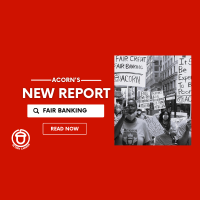ACORN Releases a New Report on Lack of Fair Credit Options, Calls for Urgent Action
Posted June 29, 2023
Today, ACORN released a new report focusing on the availability of and awareness about low-to-medium credit options for low- and moderate-income people in Canada.
The study finds that there is a very limited number of low cost or fair credit options for low- and moderate-income people, and for those that do exist, the scale of who can access them is very limited. The study comes at a time when millions of Canadians are struggling with skyrocketing rents, record high inflation and more.
For the full report in English, click here
For executive summary in English, click here
Pour le rapport complet en français, cliquez ici
Pour le résumé exécutif en français, cliquez ici
Due to persistent campaigning by ACORN and allies on fair banking, the federal government announced its commitment to lower the interest rate of predatory installment loans from 47% to 35% APR in Budget 2023. But not only is the interest rate still too high, the lack of fair credit options continues to push low- and moderate-income people to lenders that charge predatory interest rates.
ACORN’s new report captures the findings of a national online survey that was conducted between February and March 2023 and responded by 623 people nationally.
Based on the main findings, the policy recommendations that ACORN is asking the federal government to enact are the following:
- Support fair lending alternatives:
a. The federal government must create a federally funded Fair Credit Benefit so that all low-income people have access to low-cost credit options in case of an emergency.
b. The federal government should support postal banking and other low-cost alternatives. - Enhance financial inclusion:
a. ACORN repeats its call on the federal government to lower the NSF fee from $48 to $10.
b. The federal government should eliminate overdraft fees and banks must offer overdraft protection to all customers. - Lower the criminal rate of interest of predatory loans.
a. As promised in the Federal Budget 2023, the federal government must immediately lower the criminal interest rate of installment loans from 47% APR (60% Effective Annual Rate, EAR) to 35% APR (42% EAR). This interest cap should include all associated fees and costs such as insurance.
b. Further lower the interest rate of installment loans further to 30% or 20% plus Bank of Canada rate, whichever is lower.
c. Make the regulations enforceable for borrowers. Currently, it is nearly impossible for anyone to take predatory lenders to court.
********
Key Findings:
Many low-to-moderate income consumers are financially on the edge.
- More than half of the respondents never have enough to cover one month’s worth of expenses. In fact, 40% of respondents would fall into debt in case they had to make an unexpected expenditure today of $500.
- 70% of respondents are currently in debt.
- 40% of respondents experienced severe financial hardship because of the pandemic and/or inflation.
- More than half of the respondents had to borrow money in the past 12 months.
Very few medium-low-cost credit options exist.
- 87% of respondents were not aware of any medium or low interest credit options (annual interest less than 30%) or other sources of emergency funds. This question specifically asked people to exclude credit cards and lines of credit from mainstream banks/credit unions in their response.
- 22% of respondents were able to access rent bank/rent grant/other rent support programs and out of these, 41% of them were able to benefit from them.
Low-to-moderate income consumers are forced to borrow credit from predatory lenders.
- 20% of respondents took out a high-cost loan such as a payday loan/installment loan or other high-cost loan with annual interest rate over 30% in the last 12 months.
- One-third of respondents had to take out a high-cost loan very often i.e. every month in the last year in the past 12 months.
- Top reason for taking out a high-cost loan was to meet everyday living expenses such as rent, groceries etc.
- A third of the respondents said that their loans got refinanced multiple times while 20% of them mentioned it being refinanced at least once.
- 60% of respondents were highly unsatisfied with the high-cost loan.
Limited access to traditional banking institutions/products
- 40% of respondents said that banks/credit union products were “not helpful at all” in times of financial hardship.
- 19% of respondents were members of a credit union, a quarter of whom used a low-cost credit option from them.
- Main reasons for not using regular banking/financial services were a previous rejection from the bank (46%), feeling judged when going to the bank (30%), lack of trust in the banks or because banks have withdrawn from the account without their knowledge (24%); and the fact that banks are unfriendly and make respondents nervous (22%).
*Note: For the purpose of the report, the following categories were adopted to define the different types of credit (specifically APR). Low: 0-9%; Moderate: 10 -20% ; Medium: 21 – 30%; High: 31-45%; Extremely high: More than 45%

